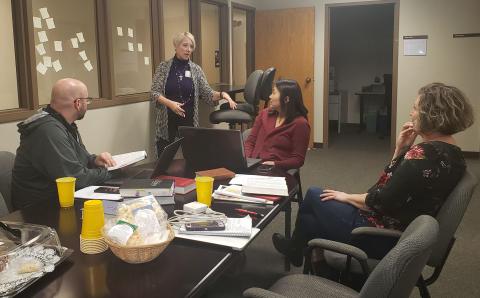This year, The Banner sponsored an article contest for young adults aged 16-25 on the topic of “Christian Love in Divisive Times.” We wanted to hear what young people had to say about the difficult conversations being had in North America right now. We received 25 entries from young people in the Christian Reformed Church. Our three judges read each one without seeing any names attached, and they agreed on three winners (see judges’ comments at the end). This is the second-place winner. Read the first-place winner here and the third-place winner here. We will be publishing some of the runners-up throughout the next several weeks here.
“Can I pray for you, too?” The man I met that day on a downtown street corner spoke these words, not knowing they would change my life. Throughout university, I was part of a group of students that went downtown on Friday nights to hand out hot chocolate to people we met. One evening, this white-haired man without a home told me his story, and I asked if I could pray for him. “Yes!” he replied with a smile, then added gently, “Can I pray for you, too?”
I froze, my face wide-eyed and hanging. My mind reeled: No! You’re homeless! You need my help; I can’t take yours. Everything I had learned about doing unto and for and to the least of these was deconstructed in this moment; my categories were flipped upside down. I was there to serve, not be served; to give, not receive. And this kind of response is precisely what causes division in the first place.
I think we can all agree we find ourselves inhabiting divisive times. The year 2020’s inventory is stocked full with a global pandemic, mass shootings, racially driven hate, and other personal and systemic oppressions and injustices. Gossip simmers in break rooms, in living rooms, about family members, bosses, neighbors, politicians, church leaders—the list goes on. We gulp this brew down like poison. Someone needs to be blamed if we’re to make sense of this brokenness. Right?
Yet we only know our world is divided because somehow we know things aren’t as they were meant to be. In Reordered Love, Reordered Lives, David Naugle calls this a “residual memory of paradise” etched upon human hearts. Though this juxtaposition of what things are and what things should be foreshadows the redemption of a broken world, the fractured things we see can make us despair and forget who we are or who we belong to or who could allow such suffering anyway. It hurts. It sears and it scars. It steals our gaze away from our God, if we let it.
Yet what if the division we saw was a mere projection of 7 billion broken hearts and divided souls? What if I was the reason for disunity? What if you were, too? The Fall means discord is a natural human tendency. The apostle Paul exhorted his audiences to be careful; his letters are teeming with calls to unity. But perhaps the biggest reason for these divisive times is that we divide this world and its people into categories, explicitly through language, covertly in our hearts. Things and people become good or bad, religious or secular, right or wrong. Complacently, we love from our “goodness” with visions to fix all that’s awry.
In The Four Loves, C. S. Lewis wrote, “To love at all is to be vulnerable. Love anything, and your heart will certainly be wrung and possibly be broken.” Consequently, we detach ourselves from real love because it’s too painful, too costly. We ponder compassion—suffering with—and toss the idea aside when we see the risk of having our own brokenness exposed. Instead, we love from a distance, from the far side of God’s grace, a calculated reaching down with a stony hand to pull people into the facade of “I’ve got my life together.”
Christian love in divisive times means not doing unto or for or to the least of these; Christian love is seeing that I, myself, am the lost sheep and the 99, the prodigal son and the elder brother, the sinner and the Pharisee, the leper and the healed, the least of these and the justified. All these things are within me—within all of us—because I am a good creation that has been crushed by the Fall. Seeing this—that good and bad sit snugly in my heart together—means loving broken people not as “other,” but as “brother.” We can acknowledge difference, but must not let difference convince us there’s not enough room at Christ’s big table.
Finally, we come to see that love is not pretending we’re immune to suffering; rather, it’s incarnationally dwelling amidst the suffering—as Jesus did—because I myself am a co-sufferer, a co-sinner. Recognizing our own sin and suffering is a liturgy that habitually forms and reorients us as we acknowledge our wretchedness and look up to the one who paid for it all. We can pore over verse after verse about how to “love thy neighbor,” but until we learn that love is an embodied posture of being in this world, love will remain an agenda, a platform, a duty of charity or pity—not a way of caring for the souls of those around us. When we find the courage to gaze into the brokenness of our own hearts, we finally understand “We love because he first loved us” (1 John 4:19), and that changes everything.
The man on the streets prayed for me that day. He showed me how high, how wide, how perfect is the abundant love of Jesus. It was big enough for both of us, flooding the cracks in our hearts as we sat on the cracks in the sidewalk. The echo of a broken Savior hovered like the Spirit over blooming waters; we were equally broken, and it was OK for us to be broken together.
Often I look to the world and become cynical. I look within my heart and find shame and despair. But when I look up and see Jesus hanging with hands and feet pierced assuredly to a cross, I find hope for shattered governments, shattered culture, shattered hearts to be put back together in a divine reassembly. At this, I hear shackles breaking, angels singing, Jesus saying, “This is why I came.”
May the words of this hymn be our unbroken and eternal prayer: “Brother, let me be your servant. Let me be as Christ to you. Pray that I might have the grace to let you be my servant too” (The Servant Song, 2012).
JUDGES’ COMMENTS:
I like the story of the homeless man praying for the writer, and I highlighted these lines: "Yet what if the division we saw was a mere projection of 7 billion broken hearts and divided souls? What if I were the reason for the disunity? What if you were too?"
Leading from a compelling opening paragraph, the author shows originality and personality in developing a well-reasoned—and often deeply personal—argument that (to use their words) love must go beyond 'an agenda, a platform, a duty of charity or pity.' A variety of sentence length and structure helps it sparkle.
About the Author
Rheanna Rosenthal recently graduated from Redeemer University with a degree in clinical psychology and English literature. She attends Maranatha Christian Reformed Church in Belleville, Ont., with her family.






